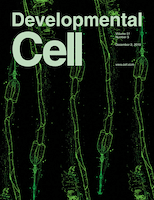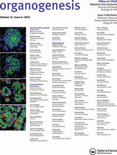
Tissue Barriers
Scope & Guideline
Illuminating the Pathways of Health and Disease
Introduction
Aims and Scopes
- Investigation of Barrier Functionality:
The journal emphasizes research on the integrity and functionality of various biological barriers, including the blood-brain barrier, gut-vascular barrier, and epithelial barriers, exploring their physiological roles and responses to external stimuli. - Pathogenesis of Barrier Dysfunction:
A significant focus is placed on understanding the mechanisms underlying barrier dysfunction in various diseases, such as inflammatory bowel disease, cancer, and infectious diseases, providing insights into disease progression and potential therapeutic targets. - Therapeutic Strategies and Innovations:
The journal encourages research on novel therapeutic approaches aimed at restoring barrier integrity or enhancing barrier function, including the use of nutraceuticals, stem cell therapy, and engineered biomaterials. - Molecular and Cellular Mechanisms:
Research published in 'Tissue Barriers' often delves into the molecular and cellular basis of barrier formation and maintenance, including studies on tight junction proteins, signaling pathways, and cellular interactions that influence barrier properties. - Modeling and Technology Development:
The journal features advancements in experimental models and technologies, such as organ-on-a-chip systems and in vitro models, to better understand barrier dynamics and to test therapeutic interventions.
Trending and Emerging
- Microbiota and Barrier Interaction:
There is a notable increase in research exploring the relationship between microbiota and barrier function, particularly in gastrointestinal diseases. Understanding how microbiota influence barrier integrity is becoming a critical area of investigation. - Inflammation and Barrier Dysfunction:
Recent publications highlight the role of inflammatory processes in disrupting barrier integrity across various tissues. This trend underscores the importance of inflammation as a common theme in many diseases affecting barrier function. - Nutraceuticals and Natural Compounds:
The exploration of nutraceuticals and natural compounds as potential modulators of barrier function has gained momentum. This trend reflects a growing interest in alternative therapeutic strategies that leverage dietary components for health benefits. - Advanced Modeling Techniques:
There is a surge in the use of advanced modeling techniques, such as organ-on-a-chip systems, to study barrier function in vitro. These innovative approaches allow for more precise investigations into barrier dynamics and responses to various stimuli. - Cancer and Barrier Interactions:
Research focusing on the interactions between cancer cells and barrier tissues is on the rise. This includes studies on how tumors manipulate barrier integrity to facilitate metastasis and evade immune responses.
Declining or Waning
- Basic Physiology of Barriers:
There appears to be a waning interest in purely physiological studies of barrier function, as recent publications increasingly emphasize pathological contexts or therapeutic interventions rather than foundational physiological research. - Historical Perspectives on Barrier Research:
Papers focusing on historical reviews or basic overviews of barrier structures and functions have become less common, indicating a move towards more applied research that addresses current challenges in barrier dysfunction. - Single-Barrier Studies:
Research that concentrates solely on individual barriers, without considering their interactions with other systems or the broader context of barrier networks, is becoming less prevalent, suggesting a shift towards integrative approaches.
Similar Journals

Current Stem Cell Research & Therapy
Unraveling the Potential of Stem Cells for HealingCurrent Stem Cell Research & Therapy, published by Bentham Science Publishers Ltd, is a leading journal dedicated to advancing the field of stem cell research. With an ISSN of 1574-888X and an E-ISSN of 2212-3946, this journal has been a valuable resource since its inception in 2006 and continues to broaden its scope through 2024. Recognized in the Q2 quartile for Medicine (miscellaneous) and ranked in the 66th percentile among its peers, the journal plays a crucial role in disseminating high-quality, peer-reviewed research that explores both the therapeutic and biological implications of stem cells. Located in the United Arab Emirates, Current Stem Cell Research & Therapy embraces a global audience of researchers, professionals, and students, providing a vibrant platform for discourse and innovation. While the journal offers subscription-based access, it remains committed to enhancing the scientific community's understanding of stem cell therapy and its applications across various medical fields.

DEVELOPMENTAL CELL
Connecting Researchers with Cutting-Edge ScienceDEVELOPMENTAL CELL, published by CELL PRESS, stands as a premier journal in the fields of Biochemistry, Genetics and Molecular Biology, Cell Biology, and Developmental Biology. With a significant influence evidenced by its Q1 rankings across several categories in 2023 and a remarkable Scopus ranking placing it at the 98th percentile for Developmental Biology, this journal is pivotal for researchers and academics aiming to advance their understanding of cellular processes. Covering a broad range of topics from molecular mechanisms to cellular developmental pathways, DEVELOPMENTAL CELL publishes cutting-edge research articles that contribute to the dynamic landscape of cell biology and related disciplines. Although it does not currently offer open access, the journal is accessible through institutional subscriptions, reinforcing its commitment to disseminating high-quality scientific knowledge produced by leading experts in the field. Based in the United States, DEVELOPMENTAL CELL continues to push the boundaries of discovery and innovation in life sciences, making it an essential resource for professionals, researchers, and students alike in the quest for foundational biological insights.

International Journal of Molecular and Cellular Medicine
Exploring Innovations in Cell Biology and GeneticsInternational Journal of Molecular and Cellular Medicine, published by the CELLULAR & MOLECULAR BIOLOGY RESEARCH CENTER in Iran, is a leading platform dedicated to advancing research in various domains of molecular and cellular sciences. With an ISSN of 2251-9637 and E-ISSN 2251-9645, this journal features a rigorous peer-review process that ensures the publication of high-quality, impactful research. Spanning from 2016 to 2024, it is categorized in the third quartile (Q3) in Biochemistry, Cell Biology, Genetics, and Molecular Biology, and second quartile (Q2) in Biotechnology, underlining its significance in the scientific community. Although currently non-open access, it maintains credible visibility through Scopus rankings, reflecting its importance in fields such as Biochemistry, Molecular Medicine, and Genetics, where it holds respectable ranks and percentiles. This journal aims to foster collaboration and knowledge dissemination among researchers, professionals, and students in the pursuit of enhancing understanding and innovation in molecular and cellular medicine.

Autophagy
Unlocking the Secrets of Cellular RecyclingAutophagy is a premier peer-reviewed journal published by Taylor & Francis, Inc. in the United States, focusing on advances in the fields of Cell Biology and Molecular Biology. With an impressive impact factor reflected in its Q1 ranking in both categories, Autophagy stands as a vital resource for researchers and professionals dedicated to understanding the intricate mechanisms of cellular degradation and recycling. The journal has been a cornerstone of scientific communication since its inception in 2005, continuing to flourish through 2024, fostering collaboration and innovation in the study of autophagic processes. Although it does not currently offer Open Access options, the journal remains highly regarded for its rigorous peer-review process and its commitment to publishing high-quality, impactful research. By bridging fundamental research with clinical applications, Autophagy plays a crucial role in advancing our understanding of various diseases, making it an essential tool for scholars and practitioners in the biomedical field.

Biochemistry Moscow Supplement Series A-Membrane and Cell Biology
Navigating the Evolving Landscape of BiochemistryBiochemistry Moscow Supplement Series A-Membrane and Cell Biology, published by PLEIADES PUBLISHING INC in the United States, is a pivotal journal in the fields of biochemistry, biophysics, and cell biology. Established in 2008, this journal has become a significant platform for disseminating novel research findings and reviews, fostering advanced studies in membrane dynamics and cellular processes. Although currently ranked in the Q4 quartile across its categories, the journal provides researchers and professionals with open access to a wealth of knowledge, helping to bridge gaps in understanding complex biochemical mechanisms. The journal’s commitment to quality and relevance is evident as it continues to contribute to the academic community through its coverage of innovative and emerging topics in cell and membrane biology. Researchers, practitioners, and students alike will find this resource invaluable for keeping abreast of the latest developments in the ever-evolving landscape of biochemistry and cellular research.

EUROPEAN JOURNAL OF PHARMACEUTICS AND BIOPHARMACEUTICS
Empowering researchers to tackle complex health challenges.European Journal of Pharmaceutics and Biopharmaceutics is a leading academic journal published by Elsevier, dedicated to advancing the field of pharmaceutical sciences through high-quality research. Established in 1991, this multidisciplinary journal offers a platform for the dissemination of innovative findings in pharmaceutics and biopharmaceutics, covering crucial aspects such as drug formulation, delivery systems, and the interface of pharmaceutical formulation with biological systems. The journal is well-regarded for its impact, earning a Q1 status in Pharmaceutical Science and consistent Q2 rankings in both Biotechnology and Medicine (Miscellaneous) categories in 2023, thereby highlighting its significance in the scientific community. With an impressive Scopus ranking of 26th percentile in Pharmaceutical Science and 60th percentile in Biotechnology, it positions itself firmly at the forefront of research, supporting researchers, professionals, and students in their quest to address complex health challenges. While the journal does not offer an open-access option, it facilitates a rigorous peer-review process, ensuring that published articles meet the highest standards of scientific integrity. For those looking to make meaningful contributions to the field, the European Journal of Pharmaceutics and Biopharmaceutics serves as an essential resource and reference point.

Nanomedicine Journal
Advancing the Future of Medicine through Nanotechnology.Nanomedicine Journal, published by Mashhad University of Medical Sciences, serves as a vital platform for research and developments in the dynamic field of nanotechnology applied to medicine. With an ISSN of 2322-3049 and an E-ISSN of 2322-5904, this Open Access journal, operational since 2013, makes cutting-edge research freely accessible to encourage collaborative efforts in this rapidly evolving domain. The journal navigates various areas, including bioengineering, biomedical engineering, materials science, and pharmacology, holding prestigious rankings in categories relevant to these fields. The 2023 Scopus Rankings reveal its significant standing within the scientific community, particularly with a 76th percentile in general medicine. By bridging the gap between laboratory technologies and clinical applications, the Nanomedicine Journal aims to empower researchers, professionals, and students alike to contribute to the innovative landscape of nanomedicine. With a convergence period extending from 2019 to 2024 and an established reputation, this journal is essential for those pursuing advancements in therapeutic solutions and diagnostics through nanotechnology.

CELLULAR & MOLECULAR BIOLOGY LETTERS
Fostering Collaboration in the World of Molecular DiscoveriesCELLULAR & MOLECULAR BIOLOGY LETTERS, published by BMC, is a premier open-access journal dedicated to disseminating high-quality research in the fields of Biochemistry, Cell Biology, and Molecular Biology. Established in 1996, the journal has emerged as a leader in its domain, boasting an impressive Q1 ranking across three critical categories as of 2023, reflecting its significant impact within the scientific community. With an ISSN of 1425-8153 and an E-ISSN of 1689-1392, it offers accessible research findings to a global audience, having been open access since 2013. Situated in the United Kingdom, at CAMPUS, 4 CRINAN ST, LONDON N1 9XW, the journal continues to serve as a vital resource for researchers, professionals, and students, contributing to advancements in the understanding of cellular and molecular processes. By providing a platform for original research, reviews, and short communications, CELLULAR & MOLECULAR BIOLOGY LETTERS plays a crucial role in fostering dialogue and collaboration within the scientific community.

CELLULAR AND MOLECULAR LIFE SCIENCES
Empowering Global Collaboration in Life Sciences ResearchCELLULAR AND MOLECULAR LIFE SCIENCES, published by SPRINGER BASEL AG, stands as a premier journal dedicated to advancing the field of cellular and molecular biology. With an impressive 2023 impact factor reflected in its Q1 rankings across key categories—including Cell Biology, Molecular Biology, and Pharmacology—it serves as a critical platform for researchers aiming to disseminate high-quality findings in these dynamic fields. Operated under an open access framework, the journal allows broader accessibility to groundbreaking research, fostering collaboration amongst scientists globally. Based in Switzerland, CELLULAR AND MOLECULAR LIFE SCIENCES has been at the forefront of scientific publishing since 1952, adapting to contemporary scientific challenges and trends, ultimately shaping the future of life sciences.

Organogenesis
Transforming Understanding in Regenerative Medicine.Organogenesis is a leading journal published by Taylor & Francis Inc, dedicated to advancing the field of developmental biology and regenerative medicine. With an ISSN of 1547-6278 and E-ISSN 1555-8592, this journal spans an extensive research scope that includes embryology, transplantation, and biomedical engineering, distinguishing itself as a crucial platform for researchers and practitioners alike. Its impact is reflected in its performance across various categories in 2023, earning Q3 rankings in Biomedical Engineering and Embryology, Q4 in Developmental Biology, and Q2 in Transplantation, showcasing its reputable standing among peer journals. Moreover, with Scopus rankings indicating strong positioning in the fields of medicine and biochemistry, Organogenesis is essential for those looking to publish or stay updated on pioneering research. The journal facilitates rigorous peer-review and offers a forum for disseminating innovative findings, making it an invaluable resource for academics, professionals, and students committed to understanding the complexities of organism development.